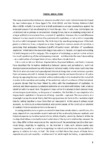Period, Break, Form
| dc.contributor.author | Sergeant, David | |
| dc.date.accessioned | 2022-02-08T12:57:46Z | |
| dc.date.issued | 2022-11-01 | |
| dc.identifier.issn | 0029-5132 | |
| dc.identifier.issn | 1945-8509 | |
| dc.identifier.uri | http://hdl.handle.net/10026.1/18689 | |
| dc.description.abstract |
This essay examines the relationship between novelistic form and a historical moment shaped by new technologies in Dave Eggers's The Circle (2013) and Kim Stanley Robinson's Red Moon (2018). In both, the novel form is itself positioned as a major counterforce against the malignant powers that are attempting to form the age. Also in both, new technologies are understood not as primary or independent shaping forces but as enabling components of a larger political and economic form, a variant of capitalism. However, the crucial difference between the two novels is in how they periodize this capitalism, an act that is inseparably bound up with their generic identity. The Circle implicitly sees the growing power of the tech giants as a historical break, a departure or step‐change from previous modes of capitalism, a periodizing that anticipates Shoshana Zuboff's recent, influential definition of “surveillance capitalism.” In Red Moon the new technology is less central to the plot and is capable of working for both the good guys and the bad. This relegation of technology as period marker reflects the novel's positioning of the contemporary moment—as it blurs into the near future setting—as a continuation of a longer historical arc rather than a break from it. Periodization and genre emerge as central to how these novels relate to social forms: genres are provisional and heuristic constructions that provide a way of talking about how novels negotiate, and negotiate with, history. | |
| dc.format.extent | 427-443 | |
| dc.language | en | |
| dc.language.iso | en | |
| dc.publisher | Duke University Press | |
| dc.rights | Attribution-NonCommercial-NoDerivatives 4.0 International | |
| dc.rights | Attribution-NonCommercial-NoDerivatives 4.0 International | |
| dc.rights.uri | http://creativecommons.org/licenses/by-nc-nd/4.0/ | |
| dc.rights.uri | http://creativecommons.org/licenses/by-nc-nd/4.0/ | |
| dc.title | Period, Break, Form | |
| dc.type | journal-article | |
| plymouth.issue | 3 | |
| plymouth.volume | 55 | |
| plymouth.publication-status | Published | |
| plymouth.journal | Novel: A Forum on Fiction | |
| dc.identifier.doi | 10.1215/00295132-10007474 | |
| plymouth.organisational-group | /Plymouth | |
| plymouth.organisational-group | /Plymouth/Faculty of Arts, Humanities and Business | |
| plymouth.organisational-group | /Plymouth/REF 2021 Researchers by UoA | |
| plymouth.organisational-group | /Plymouth/REF 2021 Researchers by UoA/UoA27 English Language and Literature | |
| plymouth.organisational-group | /Plymouth/Users by role | |
| plymouth.organisational-group | /Plymouth/Users by role/Academics | |
| plymouth.organisational-group | /Plymouth/Users by role/Researchers in ResearchFish submission | |
| dcterms.dateAccepted | 2022-02-03 | |
| dc.rights.embargodate | 2023-3-2 | |
| dc.identifier.eissn | 1945-8509 | |
| dc.rights.embargoperiod | Not known | |
| rioxxterms.versionofrecord | 10.1215/00295132-10007474 | |
| rioxxterms.licenseref.uri | http://creativecommons.org/licenses/by-nc-nd/4.0/ | |
| rioxxterms.type | Journal Article/Review |



